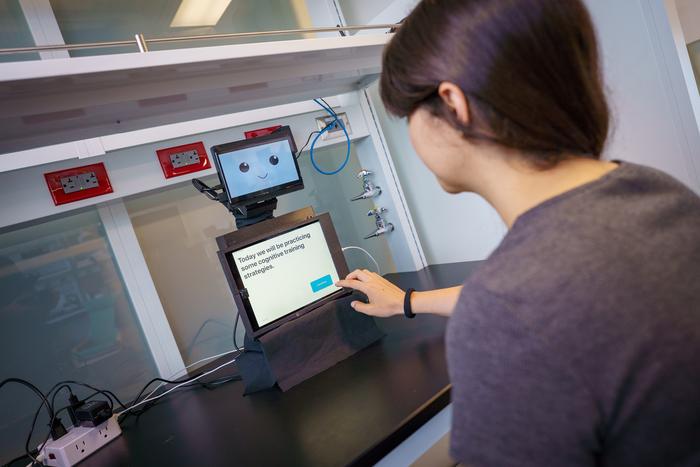
Credit: David Baillot/University of California San Diego
Meet CARMEN, short for Cognitively Assistive Robot for Motivation and Neurorehabilitation–a small, tabletop robot designed to help people with mild cognitive impairment (MCI) learn skills to improve memory, attention, and executive functioning at home.
Unlike other robots in this space, CARMEN was developed by the research team at the University of California San Diego in collaboration with clinicians, people with MCI, and their care partners. To the best of the researchers’ knowledge, CARMEN is also the only robot that teaches compensatory cognitive strategies to help improve memory and executive function.
“We wanted to make sure we were providing meaningful and practical inventions,” said Laurel Riek, a professor of computer science and emergency medicine at UC San Diego and the work’s senior author.
MCI is an in-between stage between typical aging and dementia. It affects various areas of cognitive functioning, including memory, attention, and executive functioning. About 20% of individuals over 65 have the condition, with up to 15% transitioning to dementia each year. Existing pharmacological treatments have not been able to slow or prevent this evolution, but behavioral treatments can help.
Researchers programmed CARMEN to deliver a series of simple cognitive training exercises. For example, the robot can teach participants to create routine places to leave important objects, such as keys; or learn note taking strategies to remember important things. CARMEN does this through interactive games and activities.
The research team designed CARMEN with a clear set of criteria in mind. It is important that people can use the robot independently, without clinician or researcher supervision. For this reason, CARMEN had to be plug and play, without many moving parts that require maintenance. The robot also has to be able to function with limited access to the internet, as many people do not have access to reliable connectivity. CARMEN needs to be able to function over a long period of time. The robot also has to be able to communicate clearly with users; express compassion and empathy for a person’s situation; and provide breaks after challenging tasks to help sustain engagement.
Researchers deployed CARMEN for a week in the homes of several people with MCI, who then engaged in multiple tasks with the robot, such as identifying routine places to leave household items so they don’t get lost, and placing tasks on a calendar so they won’t be forgotten. Researchers also deployed the robot in the homes of several clinicians with experience working with people with MCI. Both groups of participants completed questionnaires and interviews before and after the week-long deployments.
After the week with CARMEN, participants with MCI reported trying strategies and behaviors that they previously had written off as impossible. All participants reported that using the robot was easy. Two out of the three participants found the activities easy to understand, but one of the users struggled. All said they wanted more interaction with the robot.
“We found that CARMEN gave participants confidence to use cognitive strategies in their everyday life, and participants saw opportunities for CARMEN to exhibit greater levels of autonomy or be used for other applications,” the researchers write.
The research team presented their findings at the ACM/IEEE Human Robot Interaction (HRI) conference in March 2024, where they received a best paper award nomination.
Next steps
Next steps include deploying the robot in a larger number of homes.
Researchers also plan to give CARMEN the ability to have conversations with users, with an emphasis on preserving privacy when these conversations happen. This is both an accessibility issue (as some users might not have the fine motor skills necessary to interact with CARMEN’s touch screen), as well as because most people expect to be able to have conversations with systems in their homes. At the same time, researchers want to limit how much information CARMEN can give users. “We want to be mindful that the user still needs to do the bulk of the work, so the robot can only assist and not give too many hints,” Riek said.
Researchers are also exploring how CARMEN could assist users with other conditions, such as ADHD.
The UC San Diego team built CARMEN based on the FLEXI robot from the University of Washington. But they made substantial changes to its hardware, and wrote all its software from scratch. Researchers used ROS for the robot’s operating system.
Many elements of the project are available at https://github.com/UCSD-RHC-Lab/CARMEN
CARMEN: A Cognitively Assistive Robot for Personalized Neurorehabilitation at Home
Anya Bouzida*, Alyssa Kubota*, Dagoberto Cruz-Sandoval, Elizabeth W. Twamley, and Laurel D. Riek. 2024. CARMEN: A Cognitively Assistive Robot for Personalized Neurorehabilitation at Home. In Proceedings of the 2024 ACM/IEEE International Conference on Human-Robot Interaction (HRI ’24). Association for Computing Machinery, New York, NY, USA, 55–64.
https://doi.org/10.1145/3610977.3634971
Method of Research
Experimental study
Subject of Research
People
Article Title
CARMEN: A Cognitively Assistive Robot for Personalized Neurorehabilitation at Home
Article Publication Date
30-Mar-2024



